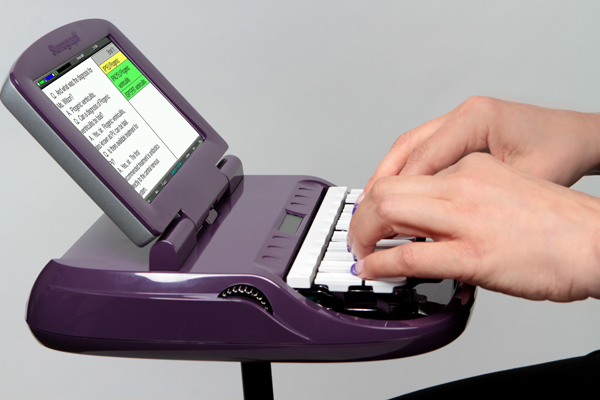Careers in shorthand
Reporting is a job that is in demand. It continues to grow worldwide and will not easily be replaced. Although attempts have been made to replace reporters with audio and video, they have proven to be insufficient in many areas. Video and audio cannot compare to the human brain!
Careers Paths 
Official court reporters are employed by the local, state or federal government to write verbatim what is said in court. This may include testimony, opening and closing statements, arraignments, motions, grand jury proceedings and more.
Freelance reporters often work independently from their own home or for a freelance reporting firm. Types of reporting may include: Statements, depositions, substituting for an absent official court reporter, arbitration and meetings for stockholders, board of directors or any place it is necessary to have a verbatim copy of what was said. Some "Corporate Reporters" travel between companies and take minutes of important meetings such as mergers and acquisitions.
Medical transcriptionists listen to recordings by physicians and other healthcare professionals and transcribe them. They transcribe a variety of healthcare related reports including emergency visit reports, diagnostic imaging studies, operations, chart reviews and final summaries. Many medical transcriptionists work from their homes. This industry is rapidly growing.
Closed captioning reporters write for television news and programs, sporting events and other events that require an instant script on TV screens for the hearing impaired.
Communications Access Realtime Translation (CART) reporters may work at colleges, high schools or government agencies to assist the hearing-impaired. Reporters for a college or high school take verbatim notes on class lectures and attend student meetings to prepare transcripts for hearing-impaired students. Many college captioning reporters use realtime skills with CAT software so students can read the computer screen while attending class, making it possible for hearing impaired students to fully participate in class.
Military reporters are trained by the armed forces to record military proceedings such as tribunals and courts martial.
Scopists are responsible for making corrections, deletions, and additions to transcripts produced by a reporter using a Computer Aided Transcription (CAT) system. Scopists must be resourceful and posess excellent English skills. The job may include researching terminology, deciphering acronyms, completing missing or partial terminology and dealing with a wide variety of fields. Many scopists work from their homes and can frequently find work all over the country without ever travelling.
Legislative reporters record all proceedings of legislative bodies for immediate copy to the public. This is a great job for those interested in seeing how laws are made and enacted.
Training requirements for court reporters
Training for occupations in the reporting field normally requires a 2 to 4 year training program. To graduate, students must be able to capture at least 225 words per minute. Many states require certification as a Certified Shorthand Reporter (CSR) which is obtained by passing a state certification test administered by a board of examiners. Reporters may take exams such as the National Court Reporters Association's to become a Registered Professional Reporter or others to acquire further certification in specific fields of reporting. It is also necessary to learn and understand a variety of terminology since reporters frequently encounter legal, medical and other jargon while reporting. English grammar and punctuation skills are vital as is a working knowlege of personal computers.

Make the career yours
Students and reporters with skills that don't quite reach the 225 per minute level can still practice their skills and make money in the process. While many college captioners are certified reporters, some get their start while being a student themselves.There are many court reporters that are examples of "thinking outside the box." Having machine shorthand skills often allows you to set your own hours and build a business around what you enjoy. A great example of this is Jan Jenson who loves hearing life stories and she especially loves elderly people. Therefore, although she was still a student, she decided to start her own business and surround herself with that which she enjoyed most. She now visits people in their homes and records their life story, and prepares it in booklet format with pictures. It is a wonderful gift that people can give to their loved ones.
Loading
